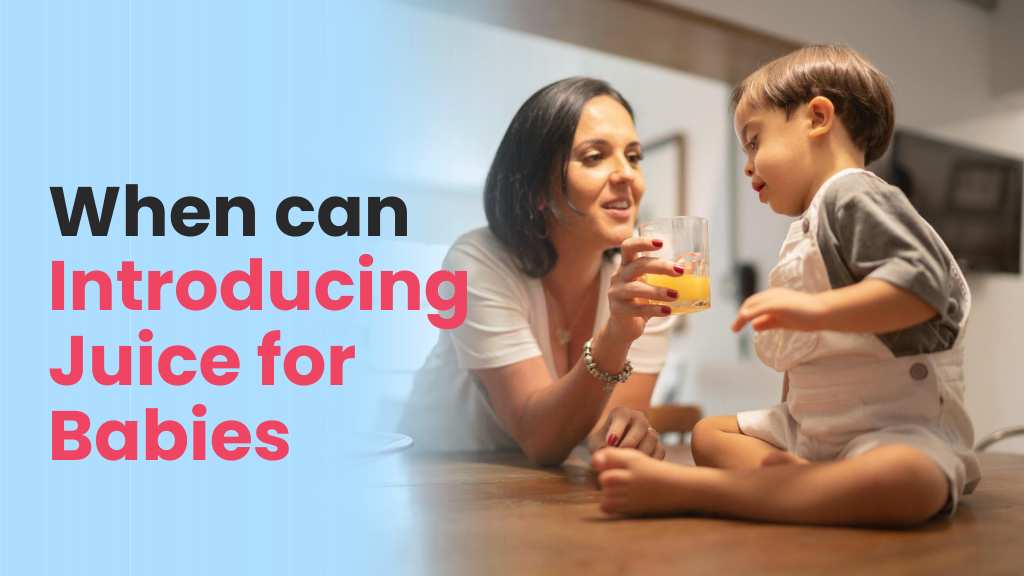
Introduction: When Can Babies Have Juice
Parenting is a wild ride. And figuring out what’s best for your little munchkin, especially when it comes to what they can munch and sip on, is all part of the adventure. When it comes to nutrition, babies start with the soft stuff, mainly breastfeeding or formula since they’re not quite ready to tackle the hard foods yet. Now, here’s the twist: many parents want to toss some juice into the mix, but the big question is when can babies have juice?
So, in this article, we will chat about when can babies have juice. Let’s get started.
What Does the Experts Have to Say About It?
The American Academy of Pediatrics (AAP) has introduced guidelines on juices for babies due to their high sugar and low nutritional content. According to AAP, it’s advised to hold off on giving your baby juice until they are at least 1 year old unless your doctor suggests it earlier for managing constipation. This updated recommendation, moving the juice introduction milestone from 6 months, is a response to growing concerns about rising rates of obesity and tooth decay in infants.
So, When Can a Baby Have Juice?
After hearing what the experts have to say about when can babies have juice, the answer is pretty straightforward, isn’t it? Babies under 12 months should not have juice as it doesn’t have any major nutritional benefit. Besides, babies get all the nutrition and fluid from formula or breast milk.
Babies under 1 year don’t need additional milk or water is needed. However, you can give them small amounts of water, but juices are still not recommended. Until and unless your baby starts eating solid food, you’ll need to add extra fluids to their diet. Lastly, it’ll be much healthier for the baby to eat fruit and drink water rather than drinking fruit juices because it has no fiber and may cultivate a habit of sweet drinks.
How Much Juice Should a Baby Have?
Now that we have established the fact that a baby under 12 months should not have any juice, how much juice should a baby have after a year? Let’s find out.
After your baby is one year old, you can give the lil one some 100 percent apple or orange juice. But, how much? They shouldn’t have more than four ounces a day. You can add some water to dilute the juice as it helps reduce the sugar intake of the baby. Another nutritional option for the baby is to eat whole fruits as it has less sugar and more fiber.
The key here is to keep it simple. Once the baby is 6 months old, they can have small amounts of water other than formula or breast milk.
Here’s a breakdown of recommended daily fluid intake for different age groups:
| Age Ranget | Water | Cow's Milk |
|---|---|---|
| 6 to 12 months | 4 to 8 ounces/day | None |
| 12 to 24 months | 8 to 32 ounces/day | 16-24 ounces of whole milk per day |
| 2 to 5 years | 8 to 40 ounces/day | 16-20 ounces of low-fat milk per day |
Why Your Baby Shouldn’t Drink Juice?
Here are several reasons why it’s advisable to avoid giving juice to your baby, even after the introduction of solids:
- Lack of Nutritional Benefit: Juice provides little to no nutritional benefit compared to whole fruits, which are rich in dietary fiber and lower in sugar.
- Potential for Weight Gain: The consumption of juice has been associated with weight gain in children.
- Risk of Tooth Decay: Juice can contribute to tooth decay due to its sugar content, posing a potential risk to your baby’s dental health.
- Development of Sweet Preferences: Introducing sweet flavors through juice may lead to your child developing a preference for sugary tastes, potentially impacting their overall dietary habits.
- Potential for Diarrhea: In some cases, the consumption of juice may lead to diarrhea, disrupting your baby’s digestive system.
Other Drinks to Avoid Giving Your Baby
When it comes to beverages for your little one, it’s not just about when to introduce juice – there’s a whole list of drinks to steer clear of for babies, toddlers, and children under 5 years old. Check it out:
- Fruit juice: Hold off until they’re at least 12 months old.
- Flavored milk: Not the best choice for the little ones.
- Sweetened drinks: This includes those with stevia and artificial sweeteners – best to skip them.
- Plant-based milk: Except for soy milk, it’s a no-go.
- Unpasteurized milk: Not the safest option for young kids.
- Toddler milk: There are better choices out there.
- Cow’s milk before 12 months: Wait until they hit the one-year mark.
- Sugary drinks: Keep those at a distance.
- Caffeinated drinks: Not for the little caffeine enthusiasts.
- 10. Honey under 12 months: Safety first – avoid giving honey to babies under a year old.
The Bottom Line - When Can Babies Have Juice?
In a nutshell, juice is a no-no until your tiny human is 12 months old. Let breast milk or formula be the hydration heroes for the first 6 months. Then, introduce water slowly, and by the time they hit their first birthday, throw in some milk. Keep it simple, keep it healthy – cheers to your little one’s growing-up hydration journey!










